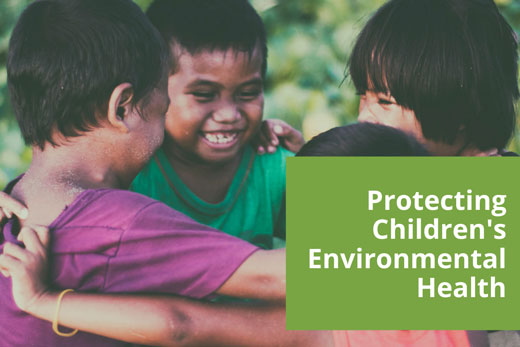Every nurse needs to know how everyday environmental hazards put people at risk for illness and death. Nurses who work with children in places like pediatric offices, children’s hospitals, child cares, schools, and camps should be especially vigilant. Kids are the most vulnerable population when it comes to environmental risks. This is due to their body composition, size in relation to exposures, tendency to play on floors, learning through taste and exploration (e.g., in medicine and cleaning cabinets), and other factors. Children also spend 30+ hours a week in institutions like schools and child cares that do not always follow environmental regulations. Together, these factors can expose kids to materials that up their risk of serious conditions like asthma, neurological disorders, and cancers.
Emory Nursing Experience (ENE)—our School’s continuing education enterprise—has partnered with the Children’s Environmental Health Network’s (CEHN) national Eco-Healthy Child Care® program, to build a national workforce of nurses and community leaders who are prepared to protect our kids. To start, ENE and CEHN have created an immersive, self-paced course called Eco-Healthy Child Care®: Protecting Children’s Environmental Health. This course is designed to help you identify—and put an end to—children’s environmental health threats within early care and learning spaces.
Nurses who complete the course will know how to:
- Council patients, families, neighbors, and colleagues on how to spot the difference between a safe and hazardous childcare setting
- Provide practical, no- and low-cost strategies to prevent environmental exposures in the places where children live, learn, and play
- Complete an easy and actionable checklist for child and staff safety in institutional settings
- Expose, and take meaningful action to address, the environmental factors and social determinants of health (SDOH) that contribute to health disparities
Every nurse—even those working in inpatient settings—has the power to change lives and safeguard children’s futures with this knowledge. The earlier you can intervene or share environmental health tips and best practices, the greater your likelihood of reducing a child’s toxic exposures over time. One conversation, at the right moment, can give families the tools they need to avoid unnecessary illnesses, hospitalizations, and death.
Nurses who complete this course will be awarded 3.0 Continuing Nursing Education contact hours from Emory Nursing Professional Development Center (ENPDC). ENPDC is accredited as a provider of continuing nursing education by the American Nurses Credentialing Center’s Commission on Accreditation (ANCC).
Click here to register for the ENE/CEHN The Eco-Healthy Child Care’s® Protecting Children’s Environmental Health e-course. To learn more about CEHN, visit cehn.org. To learn more about ENE, visit nursing.emory.edu/emory-nursing-experience.

